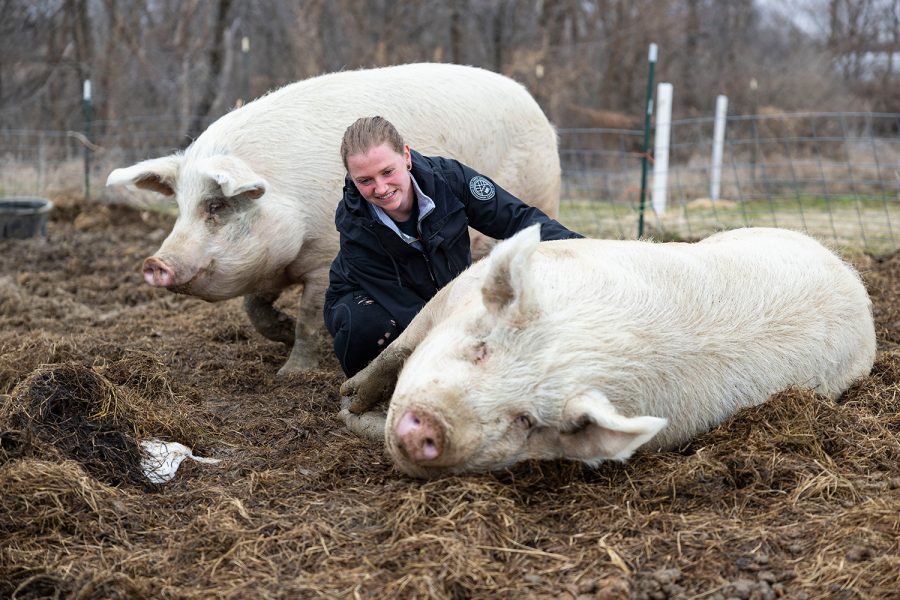Female farmers hope for more women in industry
Local female-identifying farmers are hoping to see more people like themselves in the workforce moving forward.
Owner of Rainbow Roots Farm Corbin Scholz pets Nubby the pig at the farm in Iowa City, Iowa on Saturday, March 26, 2023. Scholz uses pigs for organic fertilizer and feeds them veggie scraps for food. They’ve owned the pigs since the pigs were six-weeks old.
March 26, 2023
Female farmers in Iowa are advocating for more women in the agriculture business as Women’s History Month comes to a close.
The most recent number of Iowa farms with female producers totaled 45,786 of 86,104 farms, according to the 2017 Iowa Census of Agriculture. Nationally, 36 percent of U.S. farmers are women, and 56 percent of all farms have at least one female decision maker, according to the 2017 U.S. Census of Agriculture.
Corbin Scholz, the owner of Rainbow Roots Farm in Iowa City, is a female farmer. Scholz, who graduated from the University of Iowa with a bachelor’s degree in human physiology, changed her career path after taking a medical sociology class at the UI that changed her perspective on the medical system.
“It showed that wait room times are extremely higher for people of color, Black women have a higher mortality rate while giving birth, lower income people can’t get health insurance, and the extreme costs of our health care,” Scholz said. “I just decided I could not be a part of that system.”
Scholz said she decided to choose a career path that would help a wide variety of people rather than harm them.
“I want to be a part of a system that prevents this happening and allows us to provide healthy environments and healthy food for people so they don’t have to rely on that broken system,” she said.
Rainbow Roots Farm focuses on sustainable and organic farming and grows 60 varieties of vegetables. Managing the farm is about social and environmental justice, Scholz said.
“To me, it’s being able to feed the community while taking care of the land and to use food as a way to prevent up to 70 percent of the illnesses that we have in our society,” she said.
Iowa Women in Agriculture President Cheryl Tevis said it has become more critical that women get involved in farm operations.
The Iowa Women in Agriculture organization is a group of women farmers, landowners, and agribusiness professionals that focuses on expanding the knowledge and potential of women and help women network with other women in agriculture, Tevis said.
Tevis said women first stepped into the agriculture scene by working in bookkeeping, accounting, and managing farm taxes.
“There’s so much expertise needed,” Tevis said. “Women had already worked in bookkeeping, accounting, and taxes for the farm, but it became even more critical to have someone who’s doing that and the needs for employees expanded.”
Tevis also credits women for becoming advocates to increase communication between the agriculture industry and consumers.
“As our population in the United States moved more away from rural areas, fewer people were aware of what goes into agriculture and what it takes to operate a farm,” she said. “On the other hand, these consumers also became much more interested in food and food issues. Women were able to step into more of a bridge between agriculture and consumers and do more outreach to consumers to help fill in the blanks about agriculture and food production.”
As women have become more influential in Iowa agriculture, they have taken over their own farms.
Farming should be used to bring a community together to celebrate, Scholz said.
“It is used as a way of gathering people. Farming feels to me, not as a chore, but as a mission,” Scholz said.
Scholz is grateful to own a farm in Iowa City specifically because many farmers in the area are women.
“A lot of the farmers that do what I do are women, and just having that support of other women farmers is extremely helpful,” she said.
Brooke Sarrazin, a farm crew member at Rainbow Roots, said she believes that sometimes people do not take her as seriously as a farmer compared to how she would be treated if she were a man.
Sarrazin, who is a recent graduate of the UI with a bachelor’s degree in geography, said she has always been interested in food systems and sustainable agriculture.
“People think we garden,” Sarrazin said. “… Gardening is great, but farming isn’t gardening,” Sarrazin said.
Moving forward, Scholz said she believes agriculture should be inclusive to all people, as it allows them to express who they are.
“This beautiful work can be done in a way that’s not exclusive, but you can have systems that make sense,” Scholz said. “Women can do things men can do. People of color, queer people, and women, we’ve been shoved in this box our whole lives. It’s a way to express ourselves through agriculture.”



